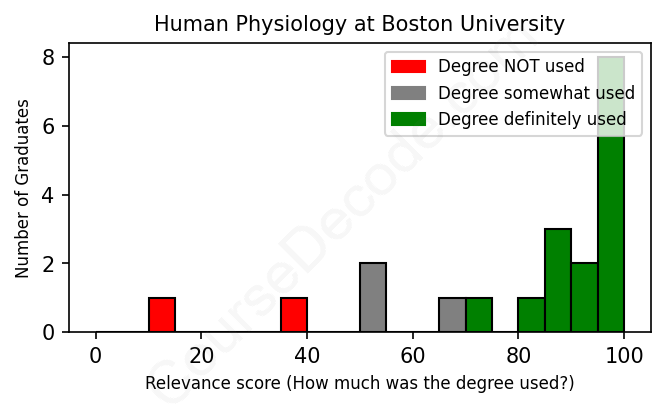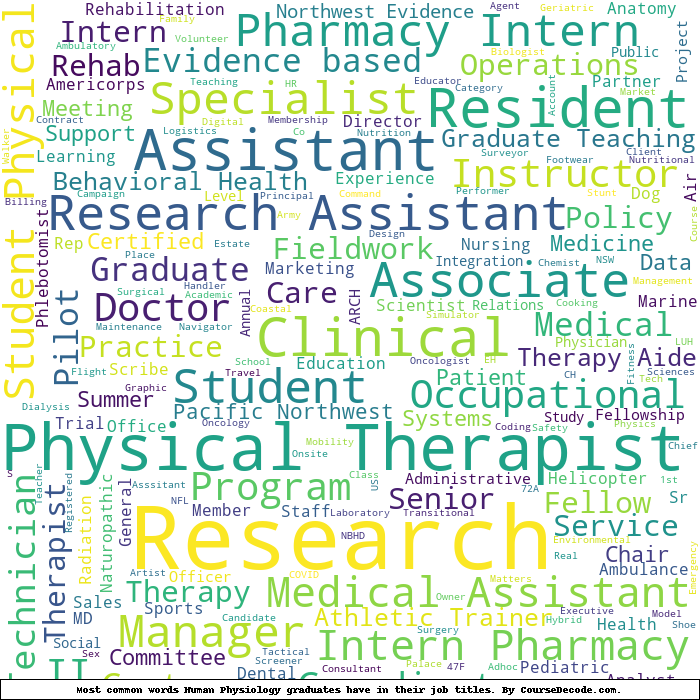
First, some facts. Of the Human Physiology graduates from Boston University we've analyzed , here's how many have used (or NOT used) their degree in their career:

These are estimates based on AI analysis of 20 LinkedIn profiles (see below).
The verdict? Significantly above average. Overall, with an average relevance score of 80%, Human Physiology graduates from Boston University have a much higher likelihood (+13%) of finding work in this field compared to the average graduate across all fields:
And for comparison, here's the chart for all profiles we've looked at across all degrees.
Also, after graduating, 80% of these graduates have pursued further education other than another Bachelor's degree (such as a Masters degree or other), compared to the average across all profiles of 35%. This suggests you may need more than just a Bachelors degree to be competitive as a Human Physiology graduate.
See the details:
|
Relevance score: 91% We think this person has gone into a career highly relevant to their degree. We think this person has gone into a career highly relevant to their degree.
DEGREE INFOGraduated in 2023 from Boston University with a Bachelor of Science - BS in Human Physiology. Also pursued further education since (see below). JOB HISTORY SINCE GRADUATIONMobility Intern Boston Medical Center (BMC) Jan 2023 - May 2023 Certified Nursing Assistant  Studley Home Jan 2023 - Present FURTHER DEGREES DONE SINCE GRADUATINGDoctoratePlymouth State University 2023 - 2026 ABOUTNo information provided. |
The top 10 most common jobs done by the graduates we've analyzed (ranked most common to least) are:
When looking at the job paths of graduates with a degree in Human Physiology from Boston University, a lot of them have landed roles that directly involve applying their knowledge in healthcare settings. Many became Physical Therapists or worked as Physical Therapy Aides, showing a clear connection to their background in human physiology. This makes sense, as physical therapy heavily relies on understanding how the body works to rehabilitate patients effectively. There are also a significant number of individuals who took paths in occupational therapy, nursing, and clinical research roles, all of which require a solid grasp of human physiology to effectively address patient needs and contribute to healthcare outcomes.
However, it's worth noting that not every job listed was closely tied to their degree. Some graduates ended up in roles like administrative positions, data entry, or other tasks where the application of human physiology knowledge was minimal or even insignificant. While many of these positions can still leverage skills acquired during their studies, such as problem-solving and communication, they aren't directly relevant to the study of human physiology. Overall, most graduates are definitely using their education in practical, impactful ways, while a minority veer off into less applicable fields. So if you're considering this degree, be ready to engage in healthcare-related roles where you can directly apply what you've learned about the human body!
Here is a visual representation of the most common words in job titles for Human Physiology graduates (this is across all Human Physiology graduates we've analyzed, not just those who went to Boston University):

Graduates of the Human Physiology program at Boston University generally find themselves on a trajectory that leans heavily toward healthcare and related fields. Right after graduation, many tend to secure positions that offer hands-on experience, such as Physical Therapy Aide, Clinical Assistants, or Research Assistants. These roles often act as stepping stones, giving recent grads the practical background they need to advance in their careers. For instance, roles like Physical Therapist and Occupational Therapist are quite common around the five-year mark, and it's clear that many graduates go on to further their education or gain specialized training in medical fields.
As time goes on, generally around the ten-year mark, many alumni have moved into more senior roles or specialized positions, such as Clinical Directors, Resident Doctors, or even Research Coordinators in prestigious hospitals. It’s notable how many have stayed in the healthcare sector, emphasizing the degree's relevance to their career success. While there are outliers who take on non-healthcare roles or pivot to different industries, the majority of these grads seem to carve out successful careers within health-related professions that are closely aligned with their studies in Human Physiology. So, if you’re considering this major, it seems like a solid pathway if you're looking to work in healthcare or related research fields!
Honestly, a Bachelor’s degree in Human Physiology, whether at Boston University or elsewhere, can be pretty challenging! It involves a lot of rigorous coursework in subjects like biology, chemistry, and anatomy, so you’ll need to be ready to hit the books and put in some serious study time. The concepts can get really detailed, and classes often require a good grasp of scientific principles and critical thinking skills. That being said, if you're passionate about the subject and willing to put in the effort, it can also be really rewarding. It might be a bit tougher than some other majors, but with the right mindset and dedication, you can totally handle it!
Most commonly, in the LinkedIn profiles we've looked at, it takes people 4 years to finish a Bachelor degree in Human Physiology.
Looking at the career paths of these Boston University grads in Human Physiology, it seems like a mixed bag when it comes to earnings. Those who pursued careers in physical therapy, occupational therapy, and research generally have steady career advancement and likely decent salaries, especially as they transition into director or supervisory roles, which usually pay well. On the flip side, some recent grads are starting with more entry-level positions, like aides and assistants, which typically don’t pay much. So, while some are moving into good financial territory, others are just starting out and might need some time to really rake it in. Overall, those who stick around and work their way up in health professions tend to make a decent living over time.
Here is a visual representation of the most common words seen in the "about" section of LinkedIn profiles who have a Bachelor degree in Human Physiology (this is across all Human Physiology graduates we've analyzed, not just those who went to Boston University). This may or may not be useful:

Here are all colleges offering a Bachelor degree in Human Physiology (ordered by the average relevance score of their Human Physiology graduates, best to worst) where we have analyzed at least 10 of their graduates:
| College | Score | Count |
|---|---|---|
 University of Iowa University of Iowa
|
88 | 10 |
 Boston University Boston University
|
80 | 20 |
 University of Oregon University of Oregon
|
74 | 19 |